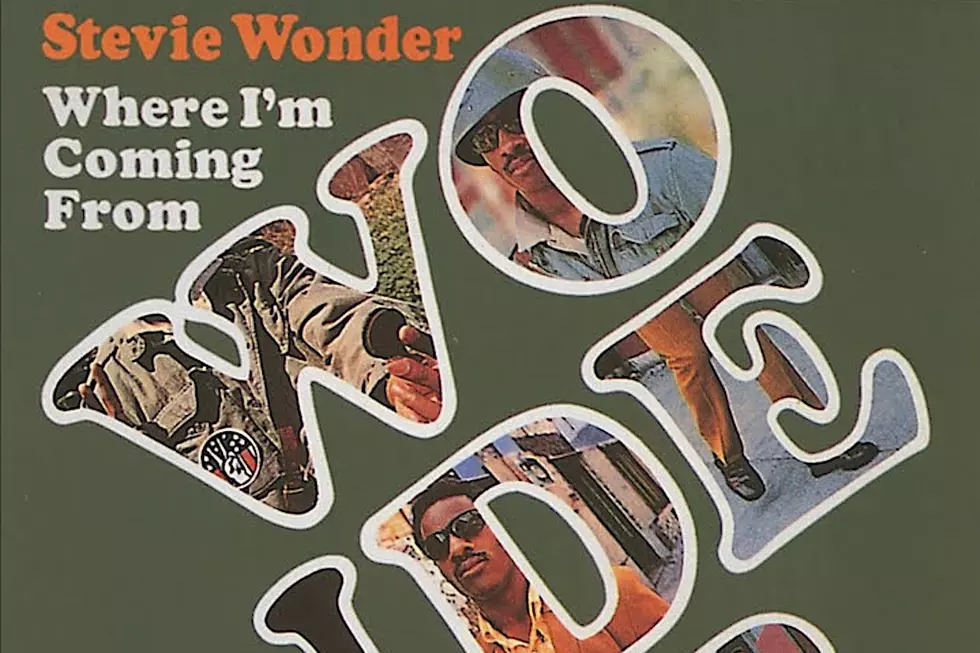
50 Years Ago: Stevie Wonder Makes a Statement With ‘Where I’m Coming From’
Stevie Wonder's legacy-securing streak of five milestone albums between 1972-76 didn't come out of nowhere. He built toward those successes with the transitional Where I'm Coming From, an album released in April 1971 that pointed to greatness.
On the cusp of 21, Wonder was taking control of his music and his life. His contract with Motown allowed him to void their decade-long agreement once he reached legal adulthood, giving him access to a burgeoning trust fund filled with previously earned royalties – and a new leveraging tool. If his hit-factory label boss wanted to keep Wonder, he'd have to renegotiate.
"I wasn't growing," Wonder later told GQ. "I just kept repeating the 'Stevie Wonder sound,' and it didn't express how I felt about what was happening in the world."
Technology was quickly evolving, and Wonder himself was growing up. "It gave me the feeling that I should change and take a chance," Wonder said during a Billboard-sponsored talk at UCLA in 1977. "I wanted to take a chance and see how they liked it."
Wonder hinted at this career crossroads with a joy-streaked 1970 cover of the Beatles' "We Can Work It Out." (He may have thought of it an inside joke but such was Wonder's burgeoning talent that he ended up releasing perhaps the best-ever cover of a Lennon-McCartney song.) Wonder also struck a note of independence as a cowriter and musical collaborator on "It's a Shame," which became the biggest hit yet for Wonder's labelmates the Spinners.
Among his songwriting cohorts on "It's a Shame" was Syreeta Wright, who would later cowrite "Signed, Sealed, Delivered (I'm Yours)" before taking a more central role on Where I'm Coming From.
Wright, a former Motown secretary turned backup singer, started composing after some encouragement from Wonder. Her fingerprints are all over the more lovestruck moments on Where I'm Coming From, and the two would marry before the record's release.
Listen to Stevie Wonder's 'If You Really Love Me'
Yet this remains very much Wonder's moment: Where I'm Coming From became his first self-produced work. That allowed Wonder to create characters and delve into themes that were far more topical and sounds that were far more modern.
The clavinet was giving way to early synthesizers, which in turn would lead Wonder to his decade-defining experiments with the Original New Timbral Orchestra, an exciting technological advancement that combined Moog and ARP outputs. Wonder would dive headlong into it all.
"I told Motown that they should give me the chance to try," Wonder said at the UCLA talk. "They weren't cutting me the way I should have been. Well, needless to say, they decided to give me a chance."
Where I'm Coming From was the last Wonder release to feature Motown's legendary studio band, known as the Funk Brothers. After this, Wonder began playing most of the instruments himself. That musical shift is hinted at on "If You Really Love Me," the album's second single, where Wonder contributes Moog bass synth, drums and piano.
A Top 10 smash on the Billboard Hot 100, the R&B chart and the adult-contemporary chart, "If You Really Love Me" also showcased a growing sophistication as Wonder shifted from a dynamic handclap-driven chorus to bittersweet, almost improvisational, verses. Elsewhere, the sweaty funk workout "Do Yourself a Favor" underscored the decade's changing attitudes, while "Never Dreamed You'd Leave in Summer" became one of his most touching ballads.
Some of Wonder's musical trips ended up as blind alleys – notably "Take Up a Course in Happiness," which was a vaudevillian misfire. And the anti-war "Think of Me as Your Soldier" didn't quite connect. But that takes nothing away from the sweeping sense of possibility on tracks like "Sunshine in Their Eyes," a boldly episodic song suite.
Listen to Stevie Wonder's 'Never Dreamed You'd Leave in Summer'
Wonder released Where I'm Coming From just weeks before his 21st birthday on May 13, 1971, seeming to be speak directly to Gordy on the Side Two-opening "I Wanna Talk to You." Ostensibly about two men in the midst of a racially charged argument, it ended up sounding like something else: Wonder's personal plea for freedom. (At one point, he cries, "I'm gonna take my share!")
Negotiations spooled out for weeks before Gordy finally related: Wonder was granted total control over his music, an unprecedented royalty figure and his own publishing company. The days of cranking out product for Motown were behind him. "They were upset at first," Wonder told Ebony in 1977, "but they began to understand – later. Whatever peak I had reached doing that kind of music, I had reached. It was important for them to understand we were going nowhere."
Over the next few years, Stevie Wonder revolutionized what messages songs could be. Lyrics that decried war, cleaved bigotry and told hard truths about materialism and poverty need not be trapped in the same old stodgy folk-rock framework. They could now groove hard – and they could become very big hit songs. Where I'm Coming From set the stage.
"We as a people are not interested in 'baby, baby' songs any more," Wonder argued a year later. "There's more to life than that."
In a strikingly symbolic turn of events, Wonder then departed Hitsville for New York City to record the follow-up – just as Motown left Detroit for Los Angeles. His emancipation was complete.
Ranking Every Stevie Wonder Album
More From 94.1 KRNA







